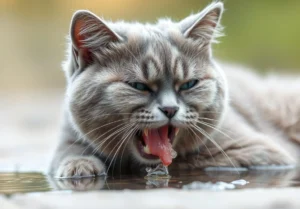Cats are notorious for their tendency to vomit, but have you ever wondered why they do it so often? Let’s explore the reasons behind why our feline friends seem to have such sensitive stomachs.
Have you ever noticed your cat vomiting frequently and wondered why this behavior is so common among our furry companions?
Possible Reasons for Increased Cat Vomiting
If you’ve been wondering why your feline friend seems to leave a trail of vomit around the house, you’re not alone. Cat vomiting is a common issue that many pet owners face. While the occasional hairball or upset stomach is normal, frequent vomiting can be a cause for concern. There are several factors that can contribute to increased cat vomiting, ranging from dietary issues to health conditions. Understanding these factors can help you better address the problem and provide relief for your cat.
Dietary Issues and Allergies
When it comes to cat vomiting, diet plays a crucial role. Just like humans, cats can have food allergies and sensitivities that lead to gastrointestinal upset. Low-quality cat food or sudden changes in diet can also trigger vomiting in cats. It’s essential to pay attention to what you’re feeding your feline friend and consider switching to a high-quality cat food that meets their nutritional needs.
In addition to allergies, dietary indiscretions can also lead to cat vomiting. Cats are notorious for getting into things they shouldn’t, such as eating grass, plants, or even household items. These non-food items can irritate their stomach and result in vomiting episodes. To prevent this, it’s crucial to keep harmful substances out of reach and provide cat-friendly toys and treats for them to enjoy.
Proper hydration is another key aspect of a healthy diet for cats. Dehydration can exacerbate gastrointestinal issues and contribute to vomiting. Make sure your cat has access to fresh water at all times and consider incorporating wet food into their diet for added moisture.
In addition to addressing dietary issues, it’s essential to rule out any underlying health conditions that could be causing your cat to vomit frequently. If your cat’s vomiting persists or is accompanied by other concerning symptoms, consult your veterinarian for a thorough evaluation and appropriate treatment.
Hairballs and Grooming Habits
Do you ever wonder why your cat seems to be reverse vacuuming the carpet with all the hairballs they produce? Well, let’s shed some light on the matter. Cats groom themselves meticulously, using their rough tongues to remove loose fur. This hair is then swallowed, and most of it passes through their digestive system without issue. However, sometimes the hair can accumulate in their stomach, forming a hairball. When a hairball can’t be digested properly, your feline friend may regurgitate it, leading to those unpleasant surprises on your floor. To help reduce hairballs, consider brushing your cat regularly to remove excess fur and prevent them from ingesting too much during grooming sessions.
Underlying Health Conditions
Your cat’s frequent vomiting may not solely be due to hairballs and grooming habits; underlying health conditions could also be to blame. Diseases such as pancreatitis, inflammatory bowel disease, or even kidney disease can cause regular bouts of vomiting in cats. If your cat is vomiting frequently, it’s essential to consult your veterinarian for a proper diagnosis and treatment plan. Other signs to watch out for include weight loss, lethargy, or changes in appetite. Remember, your cat can’t tell you when something is wrong, so it’s crucial to be proactive about their health and seek professional help when needed.
Additional Unique Insight: In addition to monitoring your cat’s grooming habits and investigating any underlying health conditions, another factor to consider is their diet. Some cats may have food sensitivities or allergies that can lead to gastrointestinal upset and vomiting. If you suspect your cat’s diet may be a contributing factor, talk to your vet about switching to a hypoallergenic or sensitive stomach formula to see if it helps reduce their vomiting episodes.
Stress and Anxiety
Have you noticed your feline friend leaving surprises around the house more often lately? Well, stress and anxiety might be the culprits behind their frequent vomiting episodes. Just like humans, cats can experience emotional distress that manifests physically in their digestive system. Changes in their environment, new family members, loud noises, or even a visit to the vet can trigger stress in your cat, leading to upset stomachs and more barfing sessions. To help your cat cope better, create a safe and quiet space for them to retreat to, provide calming pheromone products, and maintain a consistent routine. By addressing their stressors, you can reduce the chances of them decorating your floors with furballs.
Preventative Measures
To minimize the chances of your cat expelling their last meal unexpectedly, consider these preventative measures. Feed smaller, more frequent meals to avoid overeating and reduce the strain on their digestive system. Monitor their diet to ensure they are not consuming any potential allergens or toxic substances. Hydration is key, so always provide fresh water for your cat to drink. Regular grooming helps prevent hairballs, a common cause of vomiting in cats. Create a calm environment by minimizing loud noises and giving your cat ample playtime. By implementing these strategies, you can significantly reduce the frequency of your cat’s barfing episodes.
Additional Tip: Consider switching to a high-quality, easily digestible cat food to support your cat’s overall digestive health. Look for options with limited ingredients and without artificial additives to minimize potential triggers for vomiting.
For more information on feline diet and nutrition, check out this resource: American Association of Feline Practitioners – Nutrition for Cats
When to Seek Veterinary Care
If your cat vomits more than once a day, has blood in their vomit, shows signs of lethargy, refuses to eat or drink, or displays other concerning symptoms such as weight loss or diarrhea, it’s crucial to seek veterinary care promptly. These red flags may indicate underlying health issues that require professional attention, ensuring your cat receives the appropriate treatment and care they need.
Interesting Fact: Cats’ Unique Digestive Systems
Did you know that cats have an extremely quick digestive transit time? This means food moves rapidly through their system, leading to less time for proper digestion and potentially triggering vomiting. As obligate carnivores, cats’ diets are rich in protein and fat, which can also contribute to their tendency to vomit. Understanding this unique aspect of cats’ digestive systems can help you adjust their diet and feeding habits to minimize the chances of them vomiting frequently.
By paying attention to your cat’s vomiting habits, recognizing when to seek professional help, and being aware of their distinctive digestive system, you can better care for your feline friend and keep them healthy and happy.
Alex, a passionate animal lover, has experience in training and understanding animal behavior. As a proud pet parent to two dogs and three cats, he founded AnimalReport.net to share insights from animal experts and expand his knowledge of the animal kingdom.




